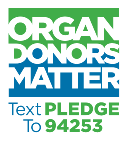Learn More
Becky Yowler & Madison Cochran, Donor Mom & Donor Sister

FAQ's
-
Who can be on the organ and tissue donor registry?
Any adult can indicate their intent to donate organs and tissues by joining a state organ and tissue donor registry. People younger than 18 years of age must have a parent or guardian's consent.
-
Are there age limits for donors?
There are no age limitations on who can donate. Whether you can donate depends on your physical condition, not age. Newborns as well as senior citizens have been organ donors.
-
If I have a previous medical condition, can I still donate?
Transplant professionals will evaluate the condition of your organs at the time of your death and determine if your organs are suitable for donation. Don’t rule yourself out. You should consider yourself a potential organ and tissue donor even if you have had a serious illness or chronic disease.
-
Can I be an organ and tissue donor and also donate my body to medical science?
Total body donation generally is not an option if you choose to be an organ and tissue donor. Eye donors still may be accepted. Also, there are a few medical schools and research organizations that still may accept an organ donor for research. If you wish to donate your entire body, you should contact the medical organization of your choice directly and make arrangements. Medical schools, research facilities, and other agencies study bodies to understand how disease affects human beings. This research is vital to saving and improving lives.
-
Why should minorities be particularly concerned about organ donation?
Minorities overall have a particularly high need for organ transplants because some diseases of the kidney, heart, lung, pancreas, and liver are found more frequently in racial and ethnic minority populations than in the general population. For example, African Americans, Asians, Native Hawaiians, and Pacific Islanders, and Hispanics/Latinos are three times more likely than Whites to suffer from end-stage renal (kidney) disease, often as the result of high blood pressure and other conditions that can damage the kidneys. Native Americans are four times more likely than Whites to suffer from diabetes. Some of these conditions that can result in organ failure are best treated through transplantation and others can only be treated by this life-saving procedure. In addition, similar blood type is essential in matching donors to recipients. Because certain blood types are more common in ethnic minority populations, increasing the number of minority donors can increase the frequency of minority transplants.
-
What organs and tissues can be donated?
Organs: heart, kidneys, pancreas, lungs, liver, and intestines
Tissue: cornea, skin, heart valves, bone, blood vessels, and connective tissue
You can also donate bone marrow, umbilical cord blood, and peripheral blood stem cells (PBSC). Click here to learn more.
-
If I'm a registered donor, will it affect the quality of medical care I receive at the hospital?
The medical team trying to save your life is separate from the transplant team. Every effort is made to save your life before donation is considered. Your doctor's number one priority is to try to save your life. The team treating you is separate from the transplant team. The transplant team only takes over after all efforts to save your life have been exhausted.
-
Will donation disfigure my body? Can there be an open casket funeral?
Donation does not interfere with having an open casket service. Surgical techniques are used to retrieve organs and tissues, and all incisions are closed.
-
Can I sell my organs?
The National Organ Transplant Act makes it illegal to sell human organs and tissues in the United States. Violators are subject to fines and imprisonment. One reason Congress made this law was to make sure the wealthy do not have an unfair advantage for obtaining donated organs and tissues.
-
Are there any costs to my family for donation?
No. Your family pays for your medical care and funeral costs, but not for organ donation. Costs related to donation are paid by the recipient, usually through insurance, Medicare, or Medicaid.
-
How many people are currently waiting for each organ to become available so they can have a transplant?
Click here to view the current waiting list to receive a life-saving transplant. The number of people requiring a life-saving transplant continues to rise faster than the number of available donors. Approximately 300 new transplant candidates are added to the waiting list each month.
-
If I would like to donate a kidney to someone I know who is in need, how can I be tested to see if I am a match?
Within the United States, living donations of a kidney can be made to a family member, friend, or anyone on the waiting list. Living donations are arranged through one of several transplant centers throughout the U.S.
Click below to find a list of transplant centers:
-
How are donated organs distributed?
Patients are matched to organs based on a number of factors including blood and tissue typing, medical need, time on the waiting list, and geographical location.
